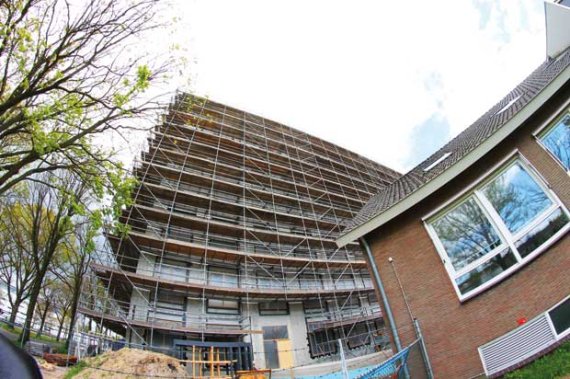Photo: Construction on campus: Helix
Emilie Scheggetman
BSc Biology
‘The fact that it is growing so fast is good news for the university, of course, but they do need to be able to cope with the growth by offering adequate facilities. Fortunately they are building on campus again, and that will have to continue. We are going to need more rooms as well. A friend of mine was in endless temporary rooms before Idealis could offer her a place. And that will get a lot worse in future. They could also give lectures on the internet, but I am not convinced that is a good idea. And of course you can’t do practicals online.’
Majed AlMuhanna
MSc Food Safety, from Saudi Arabia
‘Growth is good, because it means more students can be accepted. But the classes are already pretty full. To me, it is important to have a good relationship with my professor and my supervisor, and that will soon be difficult. And it is impossible to maintain the quality you can now offer 10 students if you have 30 students. Also, we are now in a small town where everyone knows everyone. I think if student numbers grow much more some people will feel out of things. And there will be a housing problem of course, especially for the Dutch students. They should not try to cope with that by using poor temporary housing like those containers on the Haarweg. So my advice is to grow more slowly, otherwise the quality will go down.’
Jan Schakel
Lecturer in the Rural Sociology chair group
‘This week I taught a class about which forces govern ‘technology’. We looked at concepts such as ‘instrumentalism’, ‘determinism’ and ‘constructivism’. I know from long experience that you can teach something like that better in a small group than to 400 students at a time. On the other hand, there are all sorts of technologies available which make it easier – polls, student response systems, and apps on smartphones. But, in line with our classes this week, I do wonder whether this is what we want. Or is this educational technology setting the agenda (distance learning), whereas that is not actually what we want in Wageningen? I’m not keen on it myself. At least, not as a new educational philosophy.
Maikel Sieben
BSc Biology
‘There are two sides to growth. On the one hand, we shall soon lose the village atmosphere. I come from a village myself, so to some extent I came here for that. We shall all become numbers, and it will probably all become less personal. But there will be more money, which opens up possibilities for improving the education. In the end, though, it would be a shame if soon you walked into a bar and didn’t know anybody. I can’t imagine that at the moment, actually.’
Simone Ritzer
Member of student council
‘I hope that in spite of the growth, our university won’t lose its identity as a small-scale, personal institution. We see digital education as supplementary to regular education, providing scope for extra support or indeed for an extra challenge for students who are looking for that. Lectures for large groups could also be followed online, leaving more time and space for teaching in smaller groups. But I would see completely replacing regular education with digital education as a deterioration of standards.’
Suzi Pijnenburg
BSc Food Technology
‘How can I predict what it will be like if Wageningen grows? I have never studied at a large university, so I don’t know what that is like. Little Wageningen is nice, but I have heard that big student cities are fun too. I do wonder how they are going to arrange all the practicals. On my programme there are quite a lot of them and I imagine that must be tricky with a very large group.’

